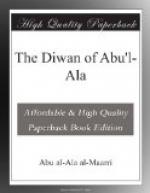CIV
A most unlovely world, said brother worm, For all of us are piteous prisoners. And if, declared the first, your thought is true, And this a prison be, melikes it well.
CV
So well that I shall weave a song of praise And thankfulness because the world was wrought For us and with such providential care— My brother, I will shame you into singing.
CVI
Then, cried the second, I shall raise a voice And see what poor apologies are made. And so they sang, these two, for many days, And while they sang the rose was beautiful.
CVII
But this affected not the songful ones, And evermore in beauty lived the rose. And when the worms were old and wiser too, They fell to silence and humility.
CVIII
A night of silence! ’Twas the swinging
sea
And this our world of darkness. And
the twain
Rolled on below the stars; they flung
a chain
Around the silences which are in me.
CIX
The shadows come, and they will come to bless
Their brother and his dwelling and his
fame,
When I shall soil no more with any blame
Or any praise the silence I possess.
APPENDIX
ON THE NAME ABU’L-ALA
Arab names have always been a stumbling-block, and centuries ago there was a treatise written which was called “The Tearing of the Veil from before Names and Patronymics.” Abu Bakr Ahmad ibn Jarit al-Misri is a fair example of the nomenclature; here we have the patronymic (Abu Bakr—father of Bakr), the personal name (Ahmad), the surname (ibn Jarit—son of Jarit), and the ethnic name (al-Misri—native of Egypt). In addition, they made use of fancy names if they were poets (such as Ssorrdorr, the sack of pearls, who died in the year 1072), names connoting kindred, habitation (such as Ahmad al-Maidani, the great collector of proverbs, who lived near the Maidan, the race-course of Naisapur), faith or trade or personal defects (such as a caliph who was called the father of flies, since on account of his offensive breath no fly would rest upon his lip), and finally they gave each other names of honour (such as sword of the empire, helper of the empire, etc.). Then the caliph gave, as a distinction, double titles and, when these became too common, triple titles. ("In this way,” says al-Biruni, “the matter is opposed to sense and clumsy to the last degree, so that a man who says the titles is fatigued when he has scarcely started and he runs the risk of being late for prayer.”) . . . The patronymic was, of all of these, the most in favour. At




